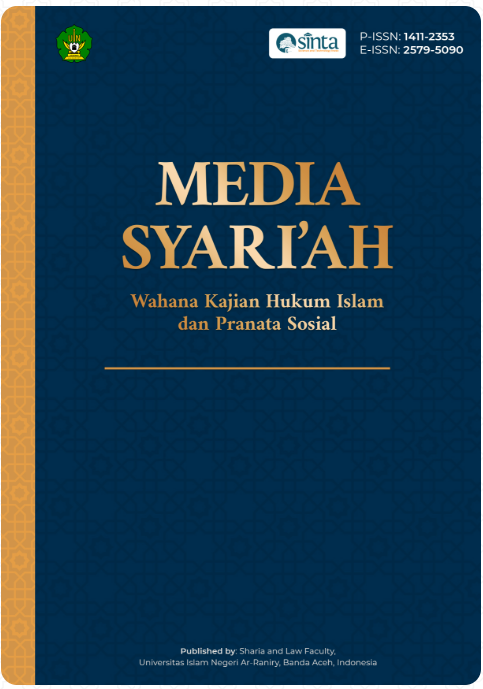Reviving Adat Law: The Middle Way between Tradition and Modernity in Ecology
DOI:
https://doi.org/10.22373/jms.v26i2.28869Keywords:
Adat Law, Environmental Management, Tradition and Modernity in EcologyAbstract
The revitalization of customary law is an effort to integrate traditional values with modernity in sustainable environmental management. Customary law plays a crucial role in maintaining ecosystem balance and ensuring the sustainability of natural resources through principles rooted in local wisdom. However, exploitative economic development and growth-oriented policies often overlook its significance. This study analyzes the challenges, causes, and solutions in revitalizing customary law to create synergy between tradition and modernity. A qualitative approach is employed through in-depth interviews, field observations, and focus group discussions (FGDs) to assess its effectiveness in environmental conservation. The findings indicate that the revitalization of customary law can enhance the effectiveness of natural resource management, strengthen the rights of Indigenous communities, and mitigate conflicts between economic and environmental interests. Integrating customary law into national and international policies, raising public awareness, and fostering cross-sector collaboration are strategic steps to optimize its role in maintaining ecological and economic balance.
References
Berkes, F. (2012). Sacred Ecology (3rd ed.). Routledge. https://www.routledge.com/Sacred-Ecology-3rd-Edition/Berkes/p/book/9780415885106.
Colchester, M. (2004). Conservation and Indigenous Peoples: A New Agenda for the 21st Century. International Institute for Environment and Development (IIED). https://pubs.iied.org/12567IIED/
Creswell, J. W. (2014). Research Design: Qualitative, Quantitative, and Mixed Methods Approaches (4th ed.). Sage Publications.
Dale, A., & Egan, D. (2011). Sustainable Community Development: An Economic Approach. Wiley-Blackwell. Link
Eisenstadt, S. N. (2000). Multiple Modernities. In Comparative Civilizations and Multiple Modernities (pp. 1-29). Brill.
Giddens, A. (1990). The Consequences of Modernity. Stanford University Press.
Guba, E. G., & Lincoln, Y. S. (1994). Competing Paradigms in Qualitative Research. In N. K. Denzin & Y. S. Lincoln (Eds.), Handbook of Qualitative Research (pp. 105-117). Sage Publications.
Gunderson, L. H., & Holling, C. S. (2002). Panarchy: Understanding Transformations in Human and Natural Systems. Island Press.
Houghton, R. A. (2007). Global Warming: The Complete Briefing (3rd ed.). Cambridge University Press.
Iqbal, M.., Yahya, A., Kamal, H. (2020). Pola Penyelesaian Sengketa Dalam Rumah Tangga Melalui Peradilan Adat Gampong Di Aceh, Jurnal Geuthee : Penelitian Multidisiplin, Vol 3, No 1, 383-392, https://doi.org/10.52626/jg.v3i1.72
Nakashima, D. J., Williams, L. R., & Thulstrup, H. D. (2012). The Role of Indigenous Knowledge in Biodiversity Conservation and Sustainable Development. United Nations Educational, Scientific and Cultural Organization (UNESCO). https://unesdoc.unesco.org/ark:/48223/pf0000218526
Natcher, D. C. (2001). Traditional Ecological Knowledge: A Key to Sustainable Development. In A. M. M. M. Abafogi (Ed.), Indigenous Knowledge and Sustainable Development (pp. 17-32). UNESCO.
Natsir, L. M., Ulya, Z., & Rachmad, A. (2024). Legal forms against corporations as perpetrators of environmental crime in Indonesia: Study based on the Environmental Protection and Management Law. Samarah, 8, 646-664. https://doi.org/10.12345/samarah.2021.v08.01.03
Natsir, M. (2024). The relevance of Islamic principles in environmental management in Aceh. Petita: Jurnal Kajian Ilmu Hukum dan Syariah. https://petita.ar-raniry.ac.id/view
Natsir, M., & Rachmad, A. (2020). Penetapan asas kearifan lokal sebagai kebijakan pidana dalam pengelolaan lingkungan hidup di Aceh. Jurnal Magister Hukum Udayana, 7(4), 468. https://doi.org/10.24843/JMHU.2020.v07.i04.p08
Pretty, J. (1995). Regenerating Agriculture: Policies and Practice for Sustainability and Self-Reliance. Earthscman. https://www.earthscan.co.uk/title/regenerating-agriculture
Downloads
Additional Files
Published
Issue
Section
License
MEDIA SYARI'AH: Wahana Kajian Hukum Islam dan Pranata Sosial has CC-BY-SA or an equivalent license as the optimal license for the publication, distribution, use, and reuse of scholarly work. Authors who publish with this journal agree to the following terms:
1. Authors retain copyright and grant the journal right of first publication with the work simultaneously licensed under a Creative Commons Attribution-ShareAlike 4.0 International License that allows others to share the work with an acknowledgment of the work's authorship and initial publication in this journal.
2. Authors are able to enter into separate, additional contractual arrangements for the non-exclusive distribution of the journal's published version of the work (e.g., post it to an institutional repository or publish it in a book), with an acknowledgment of its initial publication in this journal.
3. Authors are permitted and encouraged to post their work online (e.g., in institutional repositories or on their website) prior to and during the submission process, as it can lead to productive exchanges, as well as earlier and greater citation of published work (See The Effect of Open Access).
You are free to:
Share — copy and redistribute the material in any medium or format.
Adapt — remix, transform, and build upon the material for any purpose, even commercially.
The licensor cannot revoke these freedoms as long as you follow the license terms.
All papers published in MEDIA SYARI'AH: Wahana Kajian Hukum Islam dan Pranata Sosial are licensed under a Creative Commons Attribution-ShareAlike 4.0 International License.




.png)


.png)
.png)
.png)



